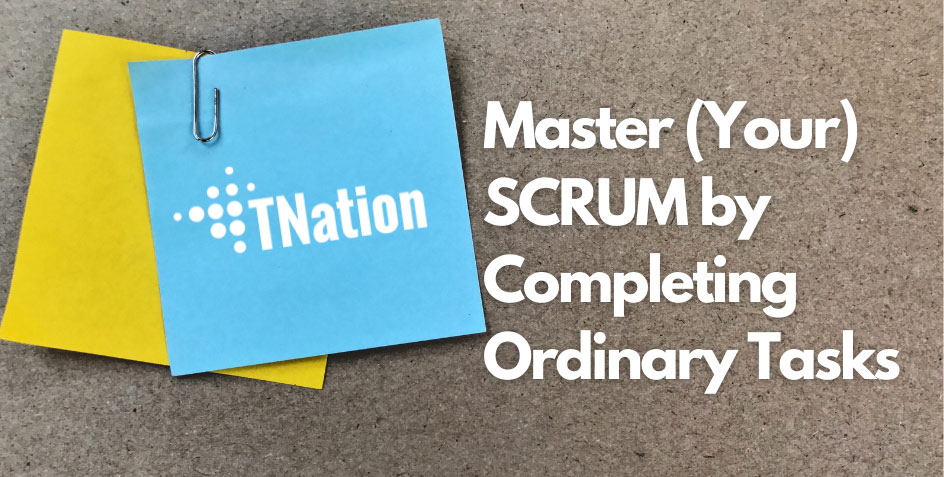People make many misconceptions about the Scrum Master responsibilities. As humans, we learn from personal experience and social interactions. That is the main reason why people believe the role is unnecessary. How many times have you seen Scrum Masters blog posts trying to explain in a rather humorous way what they do and what they don’t? Unfortunately, misconception goes beyond non-professionals and creates Scrum Master myths. In truth, in software development, the Scrum Master role is far more significant and complex.
As the title implies, Scrum Master is the teacher of Scrum, ensuring that the team follows the framework’s set of rules. Although it is not always by the book in practice, many professionals agree it is purposefully incomplete. That is because the definition of Scrum only describes the elements required to implement the theory.
It is incomplete because it uses various processes, techniques, and methods. However, it works because it leans on three pillars of transparency, inspection and adaptation. Here is where the Scrum Master comes in as a guardian of the framework and its processes.
“If we do not apply Scrum fully, then we cannot call it Scrum. It becomes something else, but it doesn’t mean it is not useful. Each team/product is different. Work processes need to be formed and adapted accordingly. The most important thing is to apply good practice. We analyse the results to see the valuable segments and use them to make progress. Consequently, we adapt and shape work processes, so the team is more efficient and comfortable. We make sure that the product is developed and delivered according to the goals.” – Miloš Podgorac, Scrum Master & COO at TNation.
The Shape-shifting Techniques of Scrum Master
Each team member conveys various skills. That uniqueness can light up the creativity of the entire team. Experienced masters can make a big difference by recognising and redirecting that creativity in the correct direction. However, the role is never idle and changing up forms is common during projects. Hence, the master can be a coach, servant leader, or the shape-shifting guardian of all things Scrum.
What Scrum Master Does
As a Servant Leader
Servant-leader means focusing on the needs of the team and other stakeholders. Hence, the goal of the role is to improve and expand teamwork. Servant-leader does that by fostering a collaborative environment, motivating and supporting the team and stakeholders.
As a Coach
The coaching part comes down to dedicating time to each individual within the Scrum team, unlocking their latent potential, and improving performance. Coaching for Scrum Master is like getting comfortable in silence while letting team members solve the challenges using their talent.
As a Mentor
Mentoring means transferring lessons learned from experience to allow continuous development. The goal is to provide individuals with tools to be self-sufficient and teams to learn to self-organise.
As an Impediment Remover
An impediment in Scrum is a factor that prevents the development team from delivering valuable software or reaching their growth. Impediments can be from illness of team members up to technical challenges over which the team has no influence. Scrum Masters role is to resolve and remove any barriers efficiently.
As a Facilitator
Facilitating in simple words means making things easier for the team. For example, Scrum Master facilitates communication, decisions, and meetings. Additionally, the master has deep knowledge and skill to use processes and tools to reflect them over the team.
Here is what a workday in the life of a Scrum Master looks like, according to TNation’s Miloš Podgorac:
- Facilitating the daily standup
- Helping the team maintain their burndown chart
- Set up retrospectives, sprint reviews, sprint planning, grooming or other gatherings
- Sheltering the team from interruptions during the sprint
- Removing impediments that affect the team
- Actively working with the Product Owner and Leadership
- Supporting collaboration between the Scrum Team and Product Owner
- Coaching the team and the organisation
What Scrum Master Does Not
There are many humorous interpretations of the Scrum Master myths and misconceptions. In his blog post, Barry Overeem wrote the top 8 Common Misunderstandings of what Scrum Master isn’t.
Not a Scrum Judge
Although people experience Scrum Master as law-bound, chasing down all that do not live by the rules. The truth is that the role myth exists because it is often more strict in practice.
Not a Scrum Superman
One of the principal tasks is to remove impediments. Some get so experienced that they see the challenge before it happens. But that does not mean it happens every time. Each job has its obstacles, and a Scrum Master has mastered removing them.
Not a Project Manager
As many of the duties include team and projects, people often confuse the role with the Project Manager. Of course, there are similarities between the two, but the Project Manager position is broader than that. Scrum Masters role is more focused on increasing the organisation’s agility and mentoring people to understand the Scrum framework.
Not a Scrum Admin
Team challenges often happen due to software or hardware issues. Anything from Jira to keyboard malfunction, it seems Scrum Master is the first at the scene. In truth, the role does include removing obstacles for the team. But, any task that takes a long time takes away from the crucial duties and may have consequences on the project.
Not a Scrum Team Boss
The role may be a part of the team. However, many confuse it with the boss who hires and fires people. In truth, Scrum Master is a servant-leader to the team, but he does not control the employee salary.
Not a Personal Assistant
As the role has many things to do with planning and organising, many people believe that Scrum Master is there to take notes of each meeting and sprint progress. Somehow, it even gets to the point when people confuse the role with HR work, considering each team member’s day off.
Mastering the Scrum Master Role
Miloš Podgorac, as a Scrum Master and COO at TNation, explains what it means for him to be one. “For all the years I spent in IT, I used my engineering and management skills to provide development teams with the guidance necessary to build great software. The role of Scrum Master is fun. Admittedly, though, it can be challenging and stressful. But, by the time the project ends, it is rewarding to see teams growing together and developing high-end software.”
Being a Scrum Master means mastering the state of mind of courage, focus, commitment, respect, and openness. Being focused on the task at hand creates a flow that makes one completely immersed in software development. The master goal is to move the team in that state of mind, providing immense productivity during Sprints. They have to ask questions, observe, and guide the team to reach quality software’s end goal.
TNation is a software development company outsourcing services and skilful programmers worldwide. If you would like consultations, feel free to give us a call.


